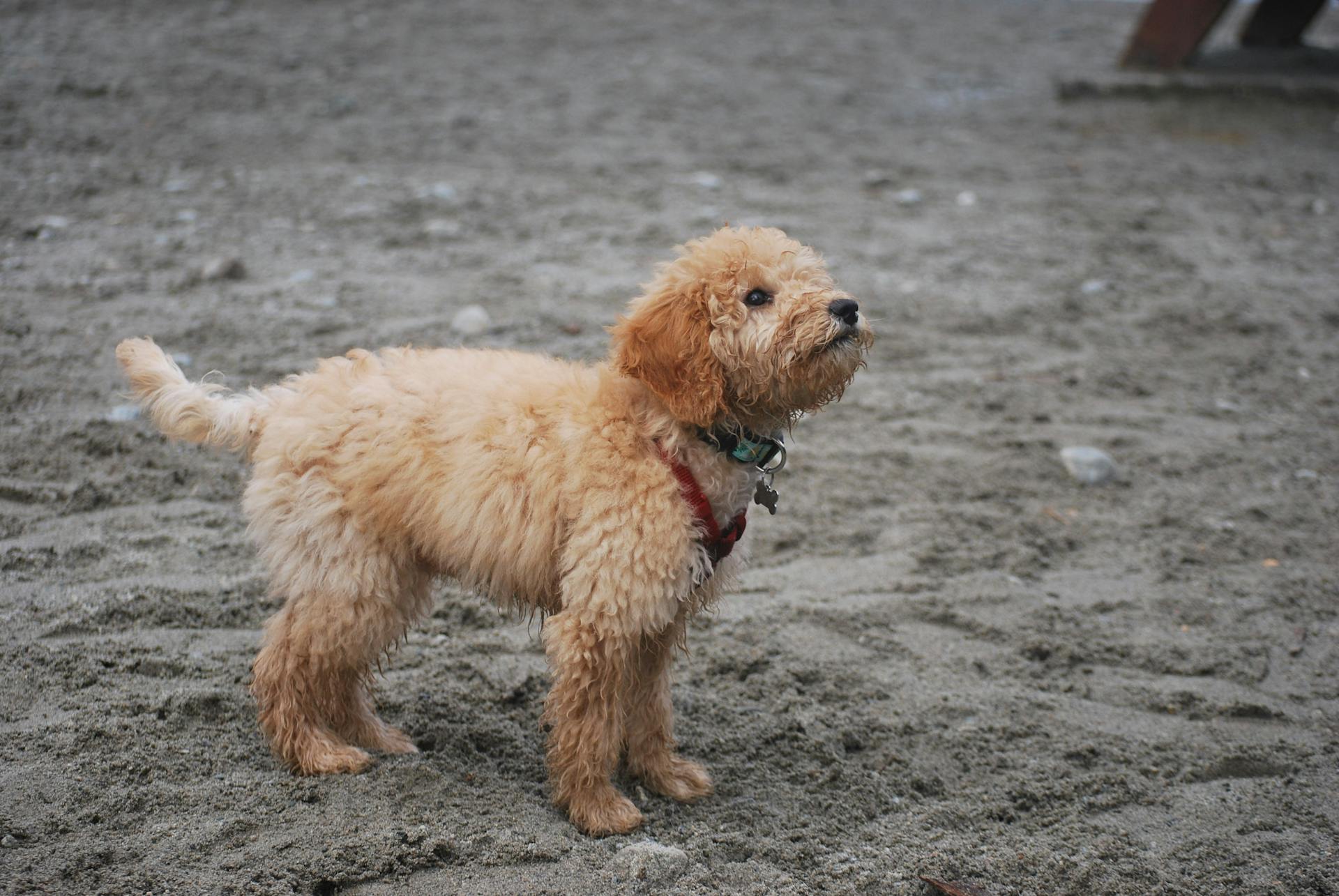
Goldendoodles are a cross between a Golden Retriever and a Poodle, and as with any hybrid breed, they can inherit health issues from their parent breeds. Hip dysplasia is a common concern for Goldendoodles, with over 50% of the breed prone to this condition.
Their Poodle parentage can also make them susceptible to eye problems, with an estimated 20% of Goldendoodles experiencing some form of eye issue. This can range from minor issues like tear staining to more serious problems like cataracts or progressive retinal atrophy.
Regular exercise and a balanced diet can help prevent or manage many of these health issues. However, it's essential to be aware of the potential risks and take steps to mitigate them.
Research suggests that responsible breeding practices, such as genetic testing and careful selection of breeding stock, can help reduce the incidence of inherited health problems in Goldendoodles.
Worth a look: Dog Health Issues by Breed
Genetic Factors
Genetic factors play a significant role in a Goldendoodle's lifespan and health. They inherit a robust genetic pool from their parent breeds, the Golden Retriever and Miniature Poodle.
This inherited genetic pool can provide a good life expectancy, but it can also predispose them to certain health conditions. Goldendoodles are generally healthy dogs that can live 10-15 years.
However, they are prone to common health conditions of the Poodle and Golden Retriever breeds. A reputable breeder can help minimize the risk of inherited health issues by thoroughly testing their breeding stock.
Genetic Influence on Lifespan
Genetic Influence on Lifespan is a crucial aspect to consider when thinking about the lifespan of our furry friends. The genetic pool from parent breeds can significantly impact a dog's life expectancy. The robust genetic pool of the Miniature Poodle and Golden Retriever breeds provides the Mini Goldendoodle with a reasonably good life expectancy. However, they may be predisposed to certain health conditions inherited from their parent breeds. This means that Mini Goldendoodles may be more prone to health issues, but with proper care and attention, they can still live a long and happy life.
Congenital Issues
Congenital Issues can have a significant impact on your Goldendoodle's health. Goldendoodles are susceptible to two eye conditions: glaucoma and cataracts.
Glaucoma is an eye disease involving increased pressure, which can be treated with long-term medication. If left untreated, glaucoma can lead to blindness.
Symptoms of glaucoma include bulging eyeballs, watery discharge, redness to the whites of the eyes, and dilated pupils. These symptoms should not be ignored, as they can indicate a serious problem.
Cataracts is a common condition in dogs that causes clouding in the eyes. This can lead to vision loss if left untreated.
If you notice that one or both of your Goldendoodle's eye lenses has a cloudy or opaque appearance, or that their vision has become more limited, consult a veterinary professional.
Intriguing read: Dog Eye Diseases
Health Issues
Goldendoodles are generally healthy dogs that can live 10-15 years, but they can be prone to common health conditions of the Poodle and Golden Retriever breeds.
Regular veterinary check-ups are crucial for early detection and management of potential eye health issues such as cataracts and Progressive Retinal Atrophy (PRA).
Noticing an awkward wink, redness, or swelling in one or both of your Goldendoodle's eyes is a sign to seek professional help.
Constant itching could indicate a skin problem, and the top skin concerns for Goldendoodles include various issues.
Goldendoodles are susceptible to ear infections due to their unique ear shape, which can lead to an irritating smell.
Some Goldendoodles may have sensitive stomachs, requiring careful attention to diet and eating habits.
Hypothyroidism is a common condition in Goldendoodles, where the thyroid gland becomes underactive, leading to a slower metabolism.
See what others are reading: Do Mini Goldendoodles Have Health Issues
Hip Dysplasia
Hip dysplasia is a common issue for large- and giant-breed dogs, including Goldendoodles, where the hip joint develops abnormally, resulting in a loose joint.
Discomfort can be displayed by pups through limited mobility, which can include reduced activity, difficulty going up stairs, or even difficulty just getting up.
For your interest: Hip Problems in Border Collies
Goldendoodles are susceptible to hip dysplasia, a genetic condition where the hip joint doesn't fit into the hip socket as it should, which can lead to arthritis and pain.
Mild cases of hip dysplasia are manageable with anti-inflammatory medication and supplements, while advanced cases might need surgery.
There are many options for treating hip dysplasia, from nutrition supplements to anti-inflammatory medications to surgery, but it’s vital to consult your vet to find the best treatment for your Goldendoodle.
The best approach to prevent hip dysplasia is to monitor your Goldendoodle's mobility and consult a veterinarian for early intervention strategies.
Goldendoodles put too much stress on their joints, making them sensitive to degenerative issues like hip dysplasia, so preventative practices are essential.
Including natural supplements in your regular diet can help prevent joint problems, such as hip dysplasia.
Eye Problems
Goldendoodles are prone to congenital eye issues, including glaucoma and cataracts. Glaucoma involves increased eye pressure, causing symptoms like bulging eyeballs, watery discharge, redness, and dilated pupils.
Regular veterinary check-ups and attentive care can help detect and manage potential eye health issues. This is especially important for Mini Goldendoodles, which may experience cataracts and Progressive Retinal Atrophy (PRA).
If you notice your Goldendoodle's eye lenses appear cloudy or opaque, or their vision becomes limited, consult a veterinarian. Cataracts can be treated with surgery, but left untreated, can lead to complete loss of vision.
Dryness of the eyes is a common issue in Goldendoodles, often inherited from parents. Ask the breeder about this potential issue when buying your Goldendoodle, and seek professional help or use special-purpose eye drops to address the problem.
Trimming your Goldendoodle's bangs is essential to prevent vision obstruction. This is crucial because their voluminous locks can easily block their vision, making it harder to detect potential eye problems.
Ear Infections
Ear infections are a common issue in Goldendoodles, and it's essential to be aware of the causes and prevention methods. Goldendoodles are prone to ear infections due to their unique ear shape, which can trap moisture and lead to bacterial growth.
Moisture buildup is a significant contributor to ear infections in Goldendoodles. This can occur after a bath, swim, or even just from playing outside on a humid day.
Bacterial growth is another common cause of ear infections in Goldendoodles. Regular ear cleaning can help prevent this from happening.
Ear mites and yeast infections can also cause ear infections in Goldendoodles. These tiny parasites or fungal infections can be treated with medication, but prevention is key.
To prevent ear infections, it's crucial to keep your Goldendoodle's ears clean and dry, especially after a bath or a swim. A mild ear cleaner or warm water with a cotton ball can be used to clean the inside of the ear.
Here are the common causes of ear infections in Goldendoodles:
- Moisture buildup
- Bacterial growth
- Presence of foreign objects
- Ear mites
- Yeast infections
Regular ear cleaning can help prevent ear infections. Use a cotton ball to clean the inside of the ear, and be sure to remove all wax and dirt.
Skin Problems
If you've noticed your Goldendoodle scratching more than usual, it could be a sign of a skin problem. Not all scratching is abnormal, but constant itching is a red flag.
Goldendoodles are prone to skin problems, especially if they're not properly groomed or if they have a food allergy. In fact, constant itching could indicate a skin problem.
Some common skin concerns for Goldendoodles include allergies, which can cause itching, redness, and inflammation. Skin allergies can be triggered by food, environmental factors, or even certain materials in their bedding.
If you suspect your Goldendoodle has a skin problem, it's essential to take them to the vet for a proper diagnosis. The vet can help you identify the underlying cause of the skin issue and recommend a treatment plan.
Explore further: Heat and Dogs Not Eating
Digestion Issues
Goldendoodles can be prone to stomach and digestion issues, including vomiting, bloody stools, weight loss, and loss of appetite, which can indicate serious problems like bloat, infections, or worms.
Some Goldendoodles may have sensitive stomachs, requiring careful attention to diet and eating habits.
Frequent vomiting, bloody stools, and prolonged loss of appetite are symptoms that shouldn't be ignored and require veterinary care.
Bloat is a serious condition that can occur in Goldendoodles, and it's essential to monitor any unusual behavior around meal times.
While there's no way to prevent inherited health issues, feeding a balanced diet can help keep your Goldendoodle's digestive system healthy.
Grain-free and boutique brand foods should be avoided, as they may contribute to heart disease in Goldendoodles.
Goldendoodles can live 10-15 years with proper care, but it's crucial to be aware of potential health issues and take steps to prevent them.
Hypothyroidism
Hypothyroidism is a common condition in dogs, particularly in Goldendoodles, where the thyroid gland becomes underactive, leading to a slower metabolism.
Symptoms of hypothyroidism in Goldendoodles may include gaining weight, seeming unusually tired, feeling cold more easily, shedding excessively, and exhibiting a slow heart rate along with high blood cholesterol levels.
A slow heart rate is one of the key symptoms of hypothyroidism in Goldendoodles, which can be a concerning sign for pet owners.
High blood cholesterol levels are also a common symptom of hypothyroidism in Goldendoodles, which can increase the risk of other health problems if left untreated.
Intriguing read: Common Health Issues with Rottweilers
Balanced Diet
Ensuring your Mini Goldendoodle consumes a balanced diet, rich in protein, healthy fats, and essential nutrients, is fundamental for its wellbeing.
Opting for high-quality, easily digestible food with minimal fillers or artificial additives is crucial, especially considering their occasionally sensitive stomachs.
A balanced diet will help your Goldendoodle maintain a healthy weight and avoid obesity-related health conditions.
You should ensure your pup eats the proper amount of high-quality dog food and always has access to fresh water.
Excess protein and calories are not necessary for pet dogs, even active ones, and may lead to obesity and kidney issues.
Treats should make up only 10% of your dog’s calorie intake and never replace a diet.
To determine the appropriate amount of food to give your Goldendoodle, chat with your veterinarian, who will assess your pup’s lifestyle, health, reproductive status, allergies, and breed to determine how many kilocalories your dog should consume daily.
Here's an interesting read: Are Chihuahuas Healthy
Generally, Goldendoodle puppies under 6 months old should be fed a minimum of three times a day and adult dogs should be fed twice a day, depending on their stage of life (adolescent versus senior age).
It's best for your dog's metabolism and mental health to be fed every 12 hours, rather than once a day.
Unless recommended by a veterinarian, dogs fed a complete and balanced commercial food diet should not need any nutritional supplements.
You should pick a food catered to your Goldendoodle’s life stage, whether she’s a puppy, adult, or senior.
Avoid feeding your dog grain-free and boutique brand foods, as they may lead to life-threatening gastric dilatation and volvulus, or GDV.
Instead, look for Association of American Feed Control Officials–compliant dog foods, such as Purina Pro Plan, Hill’s Science Diet, and Royal Canin.
Grooming and Hygiene
Grooming and Hygiene is crucial for Goldendoodles, especially when it comes to their hypoallergenic coat. Regular grooming routines are a must to prevent matting and skin issues.
Mini Goldendoodles require consistent grooming to keep their coat healthy and clean. Establishing a regular grooming routine is essential to prevent matting and skin issues.
To prevent ear infections, keep your Goldendoodle's ears clean and dry, especially after a bath or swim. This simple habit can go a long way in preventing infections.
Here are some common causes of ear infections in Goldendoodles:
- Moisture buildup
- Bacterial growth
- Presence of foreign objects
- Ear mites
- Yeast infections
Cleaning your Goldendoodle's ears is a breeze. Use a mild ear cleaner or warm water with a cotton ball to clean the inside of their ear, removing all wax and dirt.
Regular Grooming Routines
Regular grooming is crucial for Mini Goldendoodles, as their hypoallergenic coat requires consistent attention to prevent matting and skin issues.
Establishing a regular grooming routine ensures their coat remains healthy, clean, and comfortable. This can be achieved through daily brushing to prevent matting, and regular nail trimming to prevent overgrowth.
Mini Goldendoodles need their coat to be brushed daily to prevent matting, which can lead to skin issues. This is especially important for their hypoallergenic coat, which can be prone to matting.
Regular nail trimming is also essential to prevent overgrowth, which can cause discomfort and pain for your Mini Goldendoodle. Trimming their nails every 4-6 weeks is a good rule of thumb.
By following a regular grooming routine, you can help keep your Mini Goldendoodle's coat healthy and prevent skin issues. This will also help strengthen the bond between you and your dog.
Ear Cleaning
Ear cleaning is an essential part of your Goldendoodle's grooming routine. Regular ear cleaning can help prevent infections and keep your dog's ears smelling fresh.
Goldendoodles are prone to ear infections due to their unique ear shape, which can trap moisture and create a warm, humid environment that's perfect for bacteria and yeast to grow. To keep your Goldendoodle's ears clean, use a mild ear cleaner or a mixture of warm water and a cotton ball to gently wipe away wax and dirt.
You can also use a cotton bud to clean the inside of your dog's ear, but be sure to be gentle and avoid pushing too far into the ear canal. This can cause discomfort and potentially lead to more serious problems.
To prevent infections in your Goldendoodle's ears, keep them clean and dry, especially after a bath or a swim. A dirty or moist ear environment can be a breeding ground for bacteria and yeast, so it's essential to clean your dog's ears regularly.
Here are some common causes of ear infections in Goldendoodles:
- Moisture buildup
- Bacterial growth
- Presence of foreign objects
- Ear mites
- Yeast infections
By following these simple ear cleaning tips and being mindful of the potential causes of ear infections, you can help keep your Goldendoodle's ears healthy and happy.
Veterinary Care
Regular veterinary visits are crucial for monitoring your Mini Goldendoodle's overall health and catching potential issues early. Ensuring they receive routine check-ups will help prevent health problems from arising.
Monitoring their health through regular check-ups can help identify issues early on, making it easier to provide treatment and prevent more serious problems from developing. This includes monitoring their weight, dental health, and overall physical condition.
By staying on top of veterinary care, you can help your Mini Goldendoodle live a long and healthy life.
Suggestion: Do Purebred Dogs Have More Health Problems
Post-GDV Surgery
After GDV surgery, your dog will need to follow a specific recovery plan to ensure a smooth and safe healing process. Your dog will require restricted exercise for a period of time.
Following surgery, your dog will need to eat frequent, small meals, ideally two to three times daily. This will help prevent discomfort and promote a healthy recovery.
Routine Veterinary Visits
Regular veterinary visits are crucial for your Mini Goldendoodle's health. Ensuring your Mini Goldendoodle undergoes regular veterinary check-ups is pivotal in monitoring their overall health and catching potential issues early.
A well-planned schedule of check-ups can help prevent health problems. By monitoring your Mini Goldendoodle's health closely, you can catch any issues before they become serious.
Frequently Asked Questions
What is the life expectancy for a Goldendoodle?
Goldendoodles typically live for 10-15 years, with those bred from smaller Poodles often living longer. Learn more about factors that influence a Goldendoodle's lifespan.
What are the GI issues with Goldendoodles?
Goldendoodles may experience GI issues like gastritis and pancreatitis, causing vomiting, diarrhea, and abdominal pain. If you suspect your Goldendoodle has a GI problem, it's essential to consult a veterinarian for proper diagnosis and treatment.
Why are doodles unhealthy?
Doodles may be prone to health issues like hip dysplasia and skin conditions due to their genetic makeup. Understanding these potential health concerns can help you make informed decisions about bringing a Doodle into your family.
Featured Images: pexels.com


